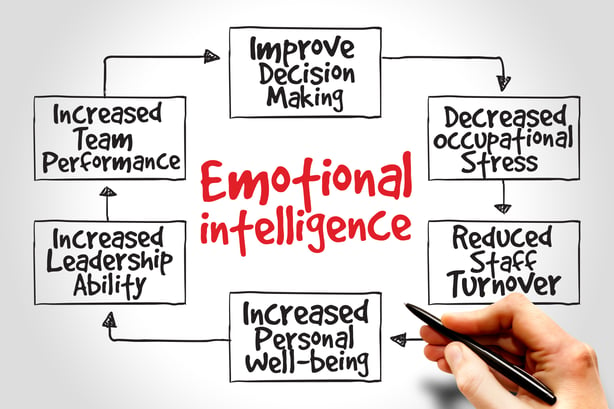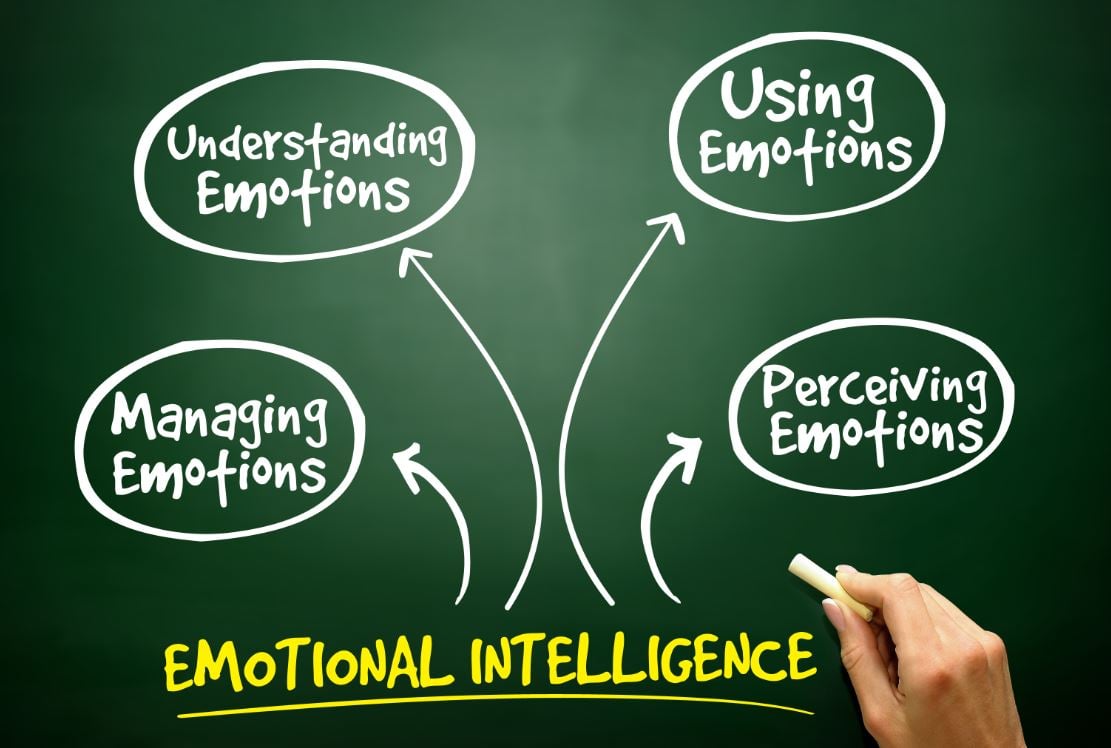Emotional Intelligence is one of the most sought-after job skills, with over 70% of hiring managers acknowledging that they rate emotional intelligence over a high IQ when it comes to finding the right person for their team.
Emotional intelligence dictates performance to a staggering degree, with research indicating that 90% of top performers are high in Emotional Intelligence (EI), while 80% of low performers are low in EI.
While emotional intelligence is one of the buzzwords of our time, there’s still some uncertainty about what it is, why it’s so valuable to employers, and whether emotional intelligence is innate or can be learnt.
Good news: Emotional Intelligence is easy to understand, and learn.
What is Emotional Intelligence (E.I)?

Emotional intelligence, at its core, is simply your awareness of emotions, both yours and of those around you.
An emotionally intelligent person is aware and in control of their emotions, empathetic to other people’s feelings, and can predict, and to some degree understand, the emotional reactions of those around them.
Why Do Employers Value E.I so Highly?
The graph below sums it up quite nicely.

An emotionally intelligent employee is generally an excellent team player with leadership qualities in abundance too. They are aware of their own emotional state, meaning they’re better at regulating their reactions when things go wrong, and because he or she is in control of their emotions, they tend to be good at accepting feedback in a constructive manner.
In addition, emotionally intelligent employees tend to be practical decision-makers as they don’t generally allow their emotions to cloud their judgement.
Their ability to empathise with others is excellent, whether the person is a close friend at work or someone of a different age group, culture, or personality type.
An emotionally intelligent person can generally see other people’s point of view quite quickly, they’re good listeners, and people consequently tend to follow them naturally out of loyalty and respect.
As you can imagine, these traits are highly desirable in the workplace.
How Do I Find Out My EI Score?
There's plenty of tests which can be found via google. We recommend the Leadership Foundation test to discover your E.I Score here.
How to Develop Your Emotional Intelligence
If you’re like most people, you look at the descriptions above and think; “well I do one or two of those things well, but I fall on the rest. What kind of perfect person are they looking for?”
In truth, even emotionally intelligent people would probably look at that list of the ideal EI qualities and think ‘I don’t do all those things well- I’m trying to get much better at a couple of them.’
We all have things to improve on, and the qualities of emotional intelligence fall on a scale. Some people find it all rather easy; for others, our emotions are more in control of us; than we are of them!
Thankfully, you’re always able to move up that EI scale with just a little bit of effort. Unlike IQ, our EI can easily grow over time by taking some steps to build your self-awareness, your emotional regulation, and your understanding and emotional interactions with others.
Here 6 Techniques that can help you...
1. Meditation

Studies have shown that a regular meditation practice (even 10 minutes a day) grows the part of the brain responsible for emotional awareness and self-control.
2. Journaling

Noting down your emotional state, regular triggers at work, achievements, and things you’re grateful for can be a beneficial way to start being aware of your emotions.
3. 4-7-8 Breathing
Youtube Video on 4-7-8 Breathing Techniques
In times of stress, you can force your body out of the parasympathetic nervous system (fight or flight) and into the sympathetic nervous system (rest and digest) by merely breathing in for 4 counts, holding for 7, then let the breath slowly out for 8 counts.
Learning tricks like this offers you greater control over your emotions, and builds a greater awareness of when stress is building up on you.
4. Treat setbacks as learning opportunities.
Easier said than done, right? But if you can learn to reframe the way you perceive ‘problems’, you’re halfway there. This even applies to the language you use. For example, let’s take answering your partner’s question, ‘How was your day at work’? If you can replace ‘terrible, I’m glad it’s over’, with ‘challenging, but I got through it’, you’re sending a positive message to yourself that you survived and surmounted the challenge.
5. Start making a common practice of trying to imagine what the other person is feeling.

When you notice yourself jumping to conclusions, getting annoyed, or making judgements on a colleague, allow your mind to consider how they might be feeling. You don’t need to say anything (in fact, don’t, you might be wrong), but the practice of considering other feelings will build your emotional intelligence practice.
6. Read fiction
Yes, seriously. It’s been proven that children who read lots of fiction display better empathy as they grow up. This is because fiction allows us into someone else’s minds and hearts, teaching us through vivid stories that people feel things differently, and react differently to pressure, sadness, and excitement. Fictional characters may be imaginary, but they are superb at building an emotional understanding of others. So get reading!
These are just a few things you can do to build your emotional intelligence. Pick one or two to start, and then grow over time. Remember, EI is on a scale, we all fall on it somewhere, and we can all improve!
What Next?
Is improving your EI on your agenda this year; perhaps in a different organisation? If the answer is yes, then we can help. Here at Lucy Walker Recruitment, we have over 30 years’ experience supporting people and organisations across the north develop their careers and grow their organisations. To find out more call us on 0113 367 2880 or drop us an email here.



.jpg)













.png)







